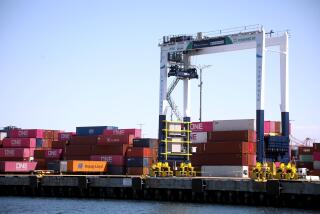Lockheed, Northrop Hope for Best in Face of Cuts : Defense: Program that employs 1,700 in Hawthorne is among those that could be scuttled. Firms take wait-and-see attitude.
- Share via
Officials at Lockheed Corp. and Northrop Grumman Corp. braced for the worst but hoped for the best Monday after the Pentagon said some of their most lucrative projects could be delayed or cut back as the result of worsening budget problems.
In all, 10 major weapons programs--including the Air Force’s proposed $71.6-billion F-22 jet fighter program, in which Lockheed is the lead contractor--have been targeted to make up for a budget shortfall, according to a memorandum the Pentagon released Monday morning.
In the memo, Deputy Defense Secretary John M. Deutch told the Air Force that it should prepare for a four-year delay in production of the F-22 Stealth fighter.
The memo also said an attack missile program that employs about 1,700 Northrop workers in Hawthorne could be scuttled.
“We haven’t been formally contacted by the Defense Department yet,” said Tony Cantafio, a spokesman for Los Angeles-based Northrop. “All we can do is wait and see what happens next.”
Other than a few managers, Calabasas-based Lockheed has yet to hire anyone in Southern California to work on its F-22 program because the plane is still in its developmental stages, a Lockheed spokesman said. However, the company’s fabled Skunk Works plant in Palmdale is expected to make many of the jet’s components for the plane’s eventual assembly in Georgia, so a delay would be another blow to the Southland’s battered aerospace industry.
The F-22’s production has already been delayed by one year, and the size of the purchase has been cut from 750 planes to 442, prompting huge increases in its unit costs. Critics say the fighter is no longer needed now that the Soviet Union has disappeared.
“I don’t think anything is set in concrete,” said Jeff Rhodes, Lockheed spokesman in Georgia. “Obviously, we’re concerned. We’re not alarmed.”
Deutch said the cuts or delays may be needed to offset the cost of a 2.5% pay increase voted by Congress this year and to help finance improvements in military readiness and “other areas.”
The two-page memo asks the four branches of the armed services to submit proposals for cutting or delaying the 10 programs or replacing them with less-expensive alternatives.
In addition to Northrop’s Tri-Service Standoff Attack Missile, other programs that Deutch suggested scrapping include the Comanche helicopter being jointly developed by Boeing Co. and United Technologies Corp. and the V-22 Osprey tilt-rotor plane, developed by Boeing and a unit of Textron Inc.
And the military is being asked to review the possibility of delaying another big-ticket item: the Navy’s new radar-evading Stealth guided-missile destroyers--in addition to the F-22.
It was not immediately clear whether all of these reductions and cancellations would ultimately be made. Deutch set a deadline of Sept. 7 for the services to submit their new proposals. He said final decisions will be made later.
The new orders to cut back, which apparently came as a surprise to the individual services, marked the most striking indication yet that the Clinton Administration may be unable to meet its defense budget targets for the coming fiscal year without making drastic reductions.
The Administration had insisted last year that even with the pay raise and other requirements, it would be able to come close to its projected defense spending levels, though critics have challenged those assumptions.
A Defense Department official said Monday that Deutch’s memorandum was designed to alert the services early to the fact that the Pentagon will have to make some “very tough” decisions in next year’s budget so they can come up with alternative cuts.
Reaction from the Army, Navy, Air Force and Marine Corps was uniformly negative. Officers warned that the services have already been stretched thin by previous budget cuts and that cancellation of new programs could hurt readiness later.
Jim Ramsey, a spokesman for McDonnell Douglas, said company officials were pleased that none of their key defense-related programs were mentioned in the Pentagon’s memo.
McDonnell’s controversial C-17 cargo-jet program accounts for about 11,000 aerospace jobs in Southern California, Ramsey said. But while Congress recently authorized continuation of the program, it has yet to approve further funding.
Myers reported from Los Angeles and Pine from Washington. The Washington Post contributed to this report.
More to Read
Inside the business of entertainment
The Wide Shot brings you news, analysis and insights on everything from streaming wars to production — and what it all means for the future.
You may occasionally receive promotional content from the Los Angeles Times.










